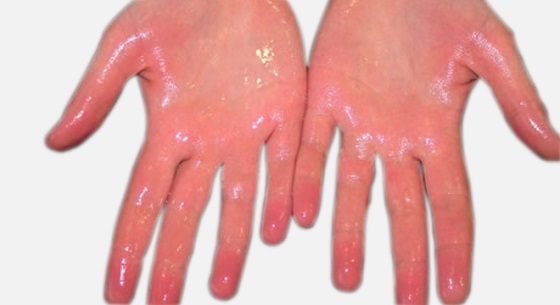Effective Dermatology Solutions for Excessive Sweating: How to Stop Sweaty Hands and Feet
Effective Dermatology Solutions for Excessive Sweating: How to Stop Sweaty Hands and Feet
Blog Article
Comprehending the Origin of Excessive Sweating and Its Influence On Every Day Life
Too much sweating, also understood as hyperhidrosis, is a problem that influences a substantial portion of the population, yet its underlying reasons and effects on day-to-day functioning remain somewhat enigmatic. While it is frequently recognized as a physical feedback to regulate body temperature, the triggers for excessive sweating can vary commonly among individuals, including not just physical aspects yet additionally psychological and emotional elements. Furthermore, the impact of this condition extends beyond mere pain, often influencing social communications and total lifestyle. By delving right into the origin of hyperhidrosis and exploring its multifaceted effects, a deeper understanding of this prevalent problem can be gotten, clarifying the complexities that individuals facing too much sweating browse each day.
Physiology of Sweat Glands
The regulation of sweat production, a critical physiological procedure, is largely controlled by the task of sweat glands dispersed across the human body. Sweat glands are categorized right into 2 main types: eccrine and apocrine glands.
When the body temperature level climbs, either due to exercise, heats, or psychological tension, the nerve system causes the sweat glands to produce sweat. This sweat is composed largely of water and electrolytes like salt and chloride. The process of sweat production is vital for keeping the body's inner temperature within a narrow, ideal variety, highlighting the important duty sweat glands play in human physiology.
Triggers for Excessive Sweating
In comprehending the origin of extreme sweating, it is critical to recognize the triggers that can lead to this physiological response. Excessive sweating, also referred to as hyperhidrosis, can be triggered by different elements, both physiological and environmental. One usual trigger is psychological anxiety or anxiousness, which can stimulate the body's sweat glands to produce even more sweat than is required for cooling down. Physical physical effort, high temperatures, and spicy foods are likewise understood to trigger excessive sweating in individuals susceptible to this condition. Furthermore, certain medical problems like menopause, diabetes, or hyperthyroidism can add to too much sweating also.
Additionally, medications such as some antidepressants, opioids, and specific supplements can also work as triggers for hyperhidrosis. Comprehending these triggers is essential in handling excessive sweating properly - Exessive Sweating. By recognizing and dealing with the details triggers that prompt too much sweating in an individual, doctor can create personalized treatment strategies to reduce this problem and improve the individual's top quality of life
Medical Conditions Associated
Related to too much sweating are various medical problems that can exacerbate this physiological feedback. One common condition is hyperhidrosis, a condition identified by abnormally boosted sweating that goes beyond the body's thermoregulatory needs. This can materialize in focal locations like the hands, soles, underarms, or face, impacting an individual's high quality of life as a result of social embarrassment and discomfort.
In addition, endocrine conditions such as hyperthyroidism, diabetic issues, and menopausal hot flashes can additionally lead to extreme sweating. Hyperthyroidism triggers an overproduction of thyroid hormonal agents, speeding up metabolism and triggering sweating.
In addition, infections like endocarditis, tuberculosis, and hiv have been linked with evening sweats, a common signs and symptom understood to disrupt rest and affect total well-being. These medical problems highlight the diverse variety of underlying elements that can add to excessive sweating, demanding complete assessment and monitoring by health care professionals.
Psychological and Psychological Aspects

Impact on Social Communications
Extreme sweating can have extensive impacts on a person's ability to involve pleasantly in social interactions. The noticeable signs of sweat spots or damp patches on garments can bring great site about humiliation and self-consciousness, creating individuals to withdraw from social circumstances. This withdrawal can impact connections, limitation social tasks, and impede personal and expert growth.

Moreover, the stress and anxiety and self-worth concerns stemming from excessive sweating can impact communication and social abilities. Individuals might battle to concentrate on conversations, join group activities, or share themselves with confidence. This can result in sensations of isolation and isolation, as social links become testing to maintain.
Conclusion

While it is generally recognized as a physiological reaction to regulate body temperature level, the triggers for too much sweating can vary widely among people, including not only physical factors yet emotional and additionally psychological elements. By diving right into the root creates of hyperhidrosis and discovering its multifaceted results, a much deeper understanding of this pervasive concern can be gotten, shedding light on the intricacies that individuals grappling with excessive sweating browse on a daily basis.
Physical physical effort, high temperatures, and spicy foods are also understood to trigger too much sweating in individuals vulnerable to this condition. By identifying and attending to the particular triggers that motivate extreme sweating in a specific, health care providers can establish customized therapy plans to ease this condition and enhance the individual's high quality of life.
Too much sweating can have profound results on an individual's capability to involve conveniently in social communications.
Report this page